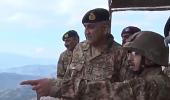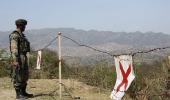'China is likely to help Pakistan in keeping the fire burning in J&K to bleed India for its own interests.'
A fascinating excerpt from Lieutenant General K Himalay Singh's Making of a General: A Himalayan Echo.
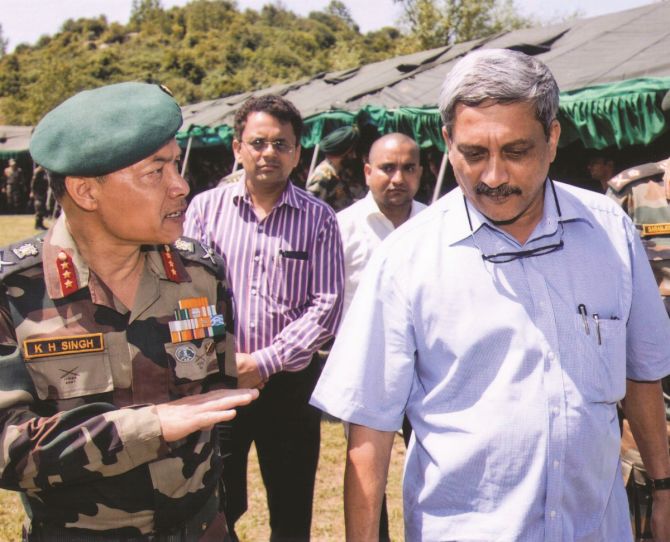
There have been frequent comments in the print and social media about the need to revisit the Counter-Insurgency (COIN) Operations Strategy of the Indian Army.
They claim that the strategy adopted by the army is mostly archaic and does not suit the modern realities.
While I partially agree with the comments, it needs to be clarified that these strategies or tactical training in our training establishments are only given as guidelines for the units and formations.
Formations adopt their own Standing Operating Procedures (SOP) keeping the local conditions and complexities in mind.
These SOPs at the tactical levels have been found to be working in most cases. In a conflict situation, the commander or the leader on the spot is permitted to exercise his or her discretion to handle the situation keeping in mind the basic tenets like minimum use of force.
The initiative on the spot is the key. For that, the junior leaders are exposed to varied conditions under which they are likely to operate while undergoing training in the schools of instructions.
Ultimately, actionable intelligence is the key to such operations. For this, the population, the state police and the machinery have to be largely on the same side.
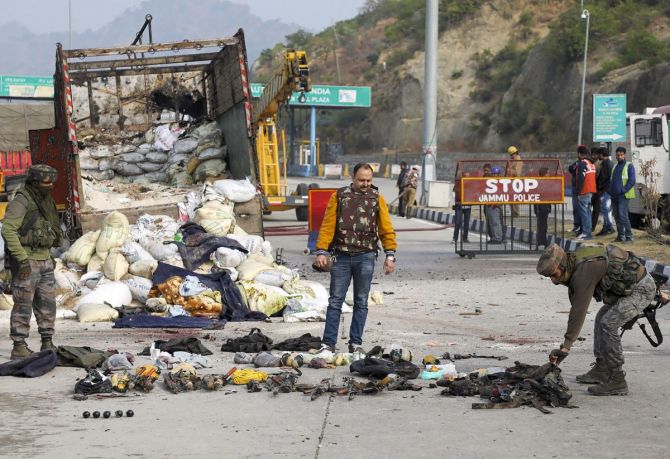
There are opinions and debates over the issue of the relevance of war in any form or not. These learned people forget that wars are but an extension of the polity of the nation.
Wherever and whenever the national interest of the country is adversely threatened there will be conflicts of varied nature.
As and when conflict resolution mechanisms fail to achieve the national objective, it is likely that war, conventional war, limited conflict or other forms of hybrid warfare are bound to occur between nations.
The armed forces are designed to prevent war with other nations and to win if war is thrust on them.
I agree that the modalities of achieving national objectives can be varied and debated. But to assume that other countries will not wage war, just as Nehru once believed, will be suicidal.
Armed forces need to evolve and transform to meet future multi-dimensional threats. To this end, I feel that we are lagging far behind.
In this context, the Role of the Military will need a serious relook. The military together with other security establishments needs to go to the drawing board again to consider the emerging challenges around the world afresh.
The decision loop in the army appears to be concentrated in the South Block while giving a semblance of consultations with the field commanders in mundane matters.
A top-down organisational transformation to empower the lower formations with clear cut National Security Objectives is imperative.
At the same time, the need to integrate the resources of the state to counter the emerging security challenges should be addressed.
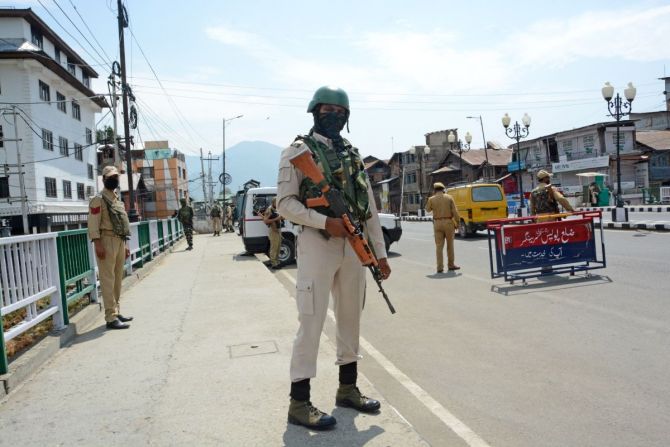
My impressions of the Pakistan army during the period were that they were ill-equipped and ill-prepared to fight a full-scale war or even hybrid war with India.
The radical groups within the Pakistani army have grown in strength. Standard of military training appears far below the standard required for a modern army.
The army appears to be pulling in two different directions, of Islamic ideas on one side and the military profession and values on the other.
Their obsession with Kashmir could be their Waterloo in the hands of the Indian Military. Kashmir, according to them, is their existential question and the cornerstone of their foreign policy.
We need to accept the fact that the Pakistan Army will never allow India to remain in peace. The moral of their troops and unit cohesiveness appears to be low too.
I recall that at least two soldiers of the Pakistan army had intentionally crossed over to our side to escape from the physical and psychological rigours in their units which were deployed on the Line of Control.
One soldier who deserted towards one of our posts in Poonch confided to me that he was troubled by the others in the unit, being a Baluchi.
He was repatriated to Pakistan through the Chakan-DaBagh crossing in the Poonch sector.
However, one should not forget the fact that a regular individual Pakistani soldier is a good fighter.

With the Islamisation of the army, the will to fight India may be stronger due to the radicalised nature of the Pakistan army doctrine at present.
The Pakistan army's dependence on Chinese and American assistance also needs to be factored in. China is likely to help Pakistan in keeping the fire burning in J&K to bleed India for its own interests.
India's diplomatic proximity to the US and Israel in recent years could also bring the Pakistan-Taliban relationship to a higher level.
Hence, the dynamics of security in J&K is dependent on the dynamics at the international level and regional powerplay
I heard stories about various options being deliberated to resolve the Kashmir issue -- some mention about a Chenab formula, LoC being made irrelevant, joint monitoring mechanisms and so on from time to time.
Having been a field commander from the lowest level to the highest during a major period of my army service, I am of the view that none of these are likely to work on the ground in the long term as long as the military controls the polity in Pakistan.
These proposals appear to be more of diplomatic jugglery, full of sound and fury, to initiate and begin talks.
The way forward could be increasing the pressure on the Pakistan army, hurting their jehadi economy further to ensure that their people reject the rule of the military by proxy.
All these efforts need to be backed by a solid military capability to deter Pakistan from initiating any form of sub-conventional war against us.
At the same time, effort to strengthen the rule of law, eliminate the intruders and bring people of the Kashmir region closer to the national mainstream, should be made.
Time is on our side too. We have a big stake in ensuring that efforts to solve the J&K issue by resorting to undue concessions to Pakistan do not bring about more divisive forces to the fore within our country.
The idea of the Islamic State of Khorasan lives in the minds of the radicalised souls in Kashmir more than anywhere else in the country.
US Marine Corps General Kenneth McKenzie had also told the Senate Armed Services Committee in December 2018 that Pakistan continues to use the Afghan Taliban as a 'Hedge' against India.
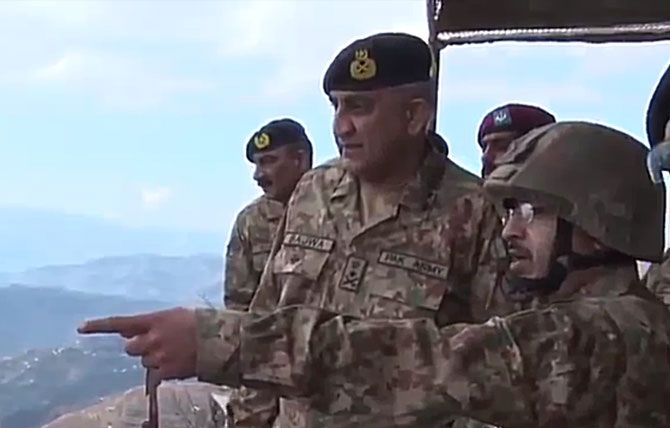
I am also of the view that migration of some highly radicalised elements from the Afghanistan-Pakistan region towards Kashmir is a real possibility once a peace deal with the US in Afghanistan which came in February 2020 is enforced.
The ISIS with a formidable number of approximately 6,000 fighters could direct some of their cadres to the valley in the foreseeable future at an opportune time.
Even the Pakistani army would be able to shift over 50,000 troops from its western borders to the east.
India is far better prepared today in terms of troops, police and polity than it was in the aftermath of the Soviet withdrawal from Afghanistan 30 years ago.
Peace in Afghanistan even after the US and Taliban accord appears remote as things stand today.
The reported interest of Iran in the Shias of Kargil in Ladakh region is also another factor to be taken into consideration to avoid a Sunni-Shia battleground in the region.
As I pen this today, 6 August 2019, the news of abrogation of Article 370 in Jammu and Kashmir reverberated across the country! A hard decision of this nature was what was required in the state.
The caveat being that the country needs to be prepared for all the possible consequences in the Indo-Pakistan relationship and the world opinion.
Pakistan views these developments as the end of the Simla Agreement and potential conflict in the LoC under a nuclear overhang and also sees the development as an opportunity for intensified terrorism in the state.
It is difficult to predict the short-term future trajectory of the jehadi militancy. The Indian State will have to be prepared to grapple with the fallout of the abrogation of Article 370 by way of proactive Perception Management, psychological ops, political and diplomatic initiatives, and above all by ensuring that the pillars of the state machinery remain intact.
The Armed Forces and other security establishments like the CRPF, J&K Police and the intelligence agencies will need to remain ever vigilant to tackle the emerging security challenges in Jammu and Kashmir.
'People First Policy' should go hand in hand with 'Nation First Policy' in the future.

All good things come to an end some time or later. The tenure of Corps Commanders is mostly limited to one year.
A Lieutenant General with two years residual service after Command of a Corps is assigned as Army Commander, subject to there being a vacancy, and those who don't have the same are sent on staff assignments or to schools of instruction.
Therefore, I was not to be assigned the responsibility of being an Army Commander. However, any ex-Corps Commander who was not assigned the higher responsibility purely due to age factor is granted the pay of the higher grade.
I have had a memorable tenure at Nagrota as Corps Commander. The eternal sight of the abode and shrine of Vaishno Mata in the horizon as my helicopter took to flight in the morning almost every alternate day was a most spiritual sight.
The dark clouds in the narrow valleys as I flew to various far-flung locations were pure delight of a lifetime. Having been a mountaineer for years, I could not have had a more enjoyable tenure.
Meeting and interacting with thousands of officers and men under my command gave me more faith in the inner strength and capability of our officers to win in any situation. Only the Generals have to live up to it.
Excerpted from Making of a General: A Himalayan Echo by Lieutenant General K Himalay Singh (retd) with the kind permission of Konark Publishers.
Feature Presentation: Rajesh Alva/Rediff.com

